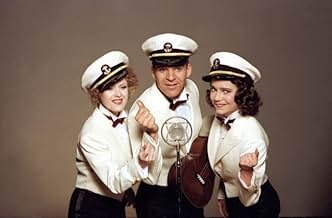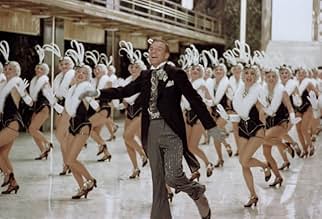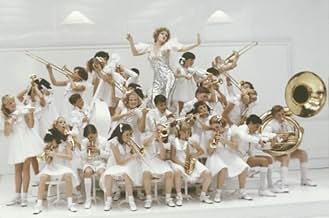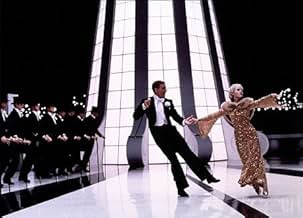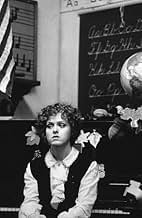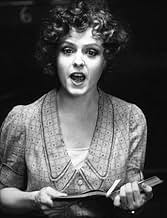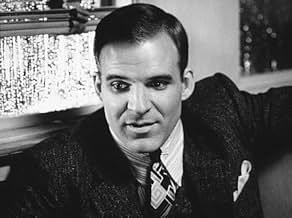Durante la Grande Depressione, un venditore di spartiti musicali cerca di scappare dalla sua ordinaria vita attraverso la musica popolare e una relazione d'amore con un'insegnante innocente.Durante la Grande Depressione, un venditore di spartiti musicali cerca di scappare dalla sua ordinaria vita attraverso la musica popolare e una relazione d'amore con un'insegnante innocente.Durante la Grande Depressione, un venditore di spartiti musicali cerca di scappare dalla sua ordinaria vita attraverso la musica popolare e una relazione d'amore con un'insegnante innocente.
- Candidato a 3 Oscar
- 3 vittorie e 9 candidature totali
- The Bartender
- (as Frank McCarthy)
- Tart
- (as Shirley Kirkes)
Recensioni in evidenza
This is a sad depressing movie juxtaposed by the bright shiny surreal song and dance show. The story is such a downer. Arthur is a horrible person. Eileen is an innocent that is destroyed. There is a horrible crime. Yet this is a fantasy with dance reminiscent of the 30s except darker. It's a very odd mix and is almost experimental in its nature. It's definitely not a comedy.
The music is good. The musical numbers are creatively shot and well-executed; the Walken number alone took weeks to film. The sets, costumes, photography, and color are beautiful and give the film a real Depression feel. Clearly, no expense was spared. The actors give it their all. The re-creations of photos and paintings (including "Nighthawks" which is actually from WW2) are breathtaking. They must have been very hard to set up, light, and shoot. But, in keeping with the film's low-key style, they're not lingered on at all, and if you look away you can miss them.
Is the problem Steve Martin? This choice caused some controversy in 1981. He lacked film experience and he might not have been the ideal choice, although it's hard to guess what other leading man could have done that vaudeville stuff in 1981. Martin, at least, doesn't obviously fall down on the job; the verdict is still out. But Peters, who even apart from this film seems to belong to the '30s, holds up her end of things.
Maybe it's the script and the way the film is conceived. If the idea is to realize what these '30s drudges fantasize about-- and to do it in a '30s-musical style, as if they imagine themselves the heroes of musicals-- then there has to be something to the drudges that makes us care what they fantasize about. But there isn't enough to these people. They're drawn as thin types; yet the material is played very slowly, as if they were supposed to turn into real people at some point. They never do, and so by the end it all peters out (no pun intended). I also thought the subplot with the young girl was a maudlin absurdity, right out of a Mary Pickford tear-jerker.
Perhaps the real problem can be traced back to the origins of the project. It plays almost like an English musical made in an American style, and it doesn't work very well. The humor in the book is too tedious, too black, and too obsessed with tit jokes to be American. And the musical numbers are too slick, loud, and overproduced to be English. The filmmakers couldn't find a way to make these two parts fit together. And so they are just jammed together over and over again. One is constantly aware of the bad fit. It just doesn't come together, but in the various parts there are still more than enough reasons to see it.
The dance numbers are 1920s-1930s material except you get 1980s color and special-effects (and loose sexual mores). Actually, these are more like put- ons of those routines, including Busby Berkeley extravaganzas. Added to the routines are humor. I just laughed out loud at the absurdity of them, which included having the actors lip-sync to the old-time singers.
The dance routines are all totally different and very entertaining, from the opening bank skit, to the kids in the classroom to Christopher Walken's striptease to Steve Martin and Bernadette Peters imitating Astaire & Rogers. The dancing is good and the songs are great: catchy and fun.
Story-wise, Martin ("Arthur Parker") plays a boorish, profane, lying and just plain unlikeable character. Are we supposed to root for him? Maybe we are to root for Peters, who plays "Lulu," the school teacher-turned- prostitute (sounds like real-life these days with all the female teacher sex scandals). Hey, I like Martin in a lot of films. He can be a very entertaining guy, but the character he plays in here.....well, you can have him and this very cynical and depressing story. No thanks.
It's no surprise to me it bombed at the box office. Too bad, because with a more appealing story a lot more people would have been treated to the great musical numbers in this movie.
Lo sapevi?
- QuizChristopher Walken's bar-top dance scene took two months of rehearsal and two days of shooting. He claims he got compliments later from fans Fred Astaire and Gene Kelly.
- BlooperIn the classroom, a modern Canadian flag can be seen. It wasn't designed until 1964.
- Citazioni
Joan Parker: [referring to Arthur's male organ, after discovering he's having an affair] Cut his thing off.
[the detective shows a look of shock and disgust]
Joan Parker: I want them to cut his thing off and bury it!
- Colonne sonorePennies from Heaven
(1936)
Written by Johnny Burke and Arthur Johnston
Published by Intersong Music
Performed by Arthur Tracy
Courtesy of Decca Co. Ltd
Later sung by Steve Martin (uncredited)
I più visti
- How long is Pennies from Heaven?Powered by Alexa
Dettagli
- Data di uscita
- Paese di origine
- Lingua
- Celebre anche come
- Pennies from Heaven
- Luoghi delle riprese
- 4th Street Bridge, Los Angeles, California, Stati Uniti(murder scene, S Santa Fe Ave. Overpass)
- Aziende produttrici
- Vedi altri crediti dell’azienda su IMDbPro
Botteghino
- Budget
- 22.000.000 USD (previsto)
- Lordo Stati Uniti e Canada
- 9.171.289 USD
- Lordo in tutto il mondo
- 9.171.289 USD
- Tempo di esecuzione1 ora 48 minuti
- Mix di suoni
- Proporzioni
- 1.85 : 1
Contribuisci a questa pagina




